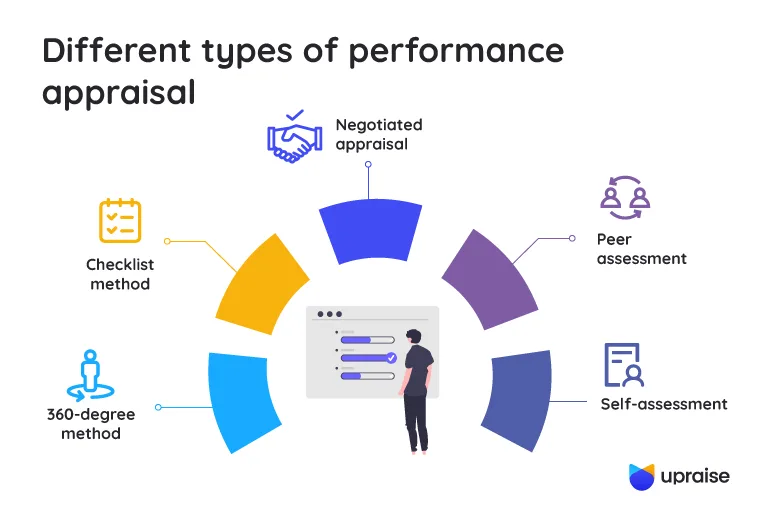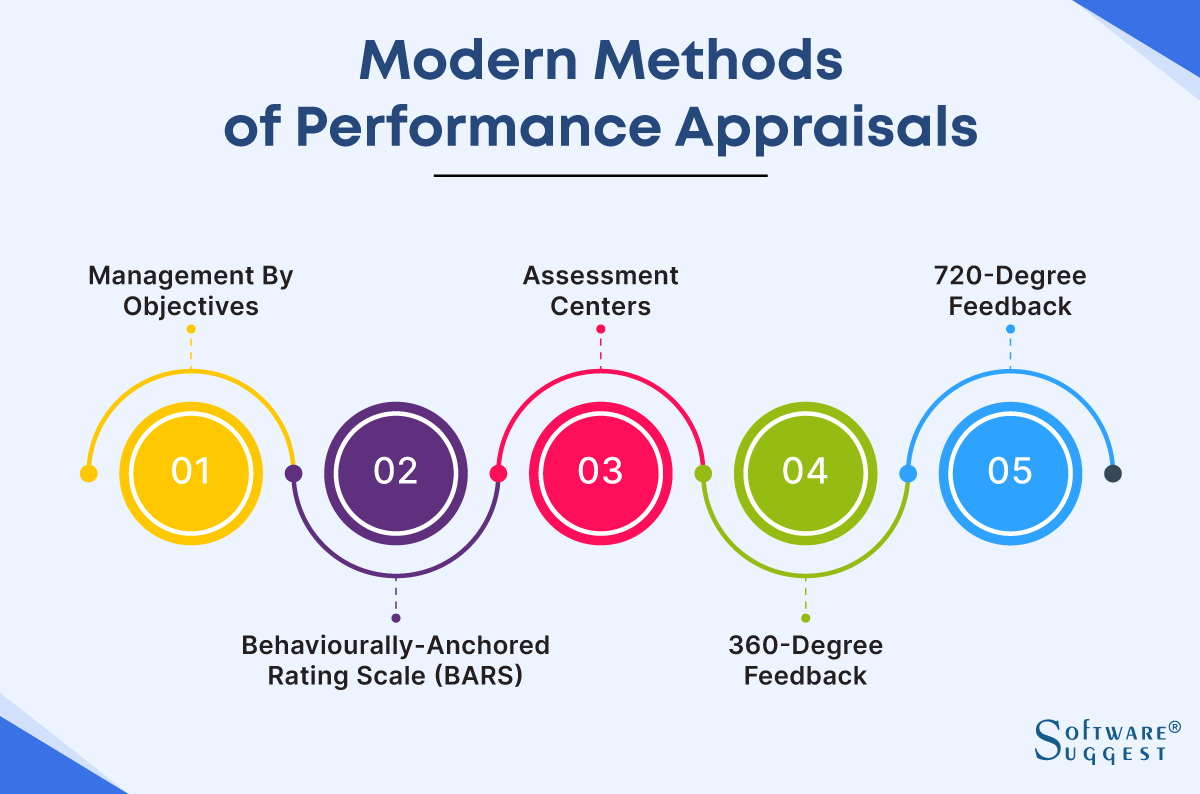Mastering Performance Appraisal: Key Objectives and Proven Types You Need to Know
Table of Contents

- jaro education
- 3, August 2024
- 12:00 pm
The different types of performance appraisal act as systematic ways to evaluate an employee’s performance at the workplace and their contribution to the development of their team and the organization. This is usually carried out by evaluating various aspects of the employee’s work and quantifying their ratings into results. These types of performance evaluations can be conducted in various capacities and by different people within the organization, from self-assessment and peer assessment to supervisor and higher management evaluations. They end with a formal review meeting where the employee and their immediate leadership get together to understand their performance.
What is the Importance of the Different Types of Performance Appraisals?
- Employee Growth: The different types of performance appraisals lay the foundation of an employee’s strengths and weaknesses and on its basis, companies build personal development goals. They guide employees on how to enhance their skills and performance.
- Goal Setting and Execution: Every employee’s individual goals are like pillars that hold up the organization’s overall objectives. So, goal setting is an important type of performance appraisal tool to ensure everyone is on the same page in channeling their efforts towards a collective goal.
- Motivation and Recognition: The different types of employee appraisals act as ways to recognise and reward great performances, which boosts their morale to continue giving their best to the organization. Constructive feedback on ways they can improve helps employees work on their weaknesses and adhere to expectations.
- Open, One-On-One Dialogue: With the different methods of performance appraisal, there is space for open communication between employees and senior leadership. This is a two-way street and helps teams arrive at a middle ground that benefits everyone.
- Internal Operations: These types of performance appraisals provide the organization with a way to identify high-performing candidates as well as those with room for improvement. This is crucial data for various HR decisions like promotions, salary negotiations and terminations.

*upraise.io
The time cycle for the types of performance appraisals varies among organizations, but generally, it happens annually, semi-annually or quarterly. Annual cycles might even be synced with the accounting calendar so that everyone’s results can be quantified. They are also the most traditional type of employee appraisals and offer a comprehensive year-round review. Semi-annual and quarterly appraisals allow for more frequent feedback, which can lead to more timely adjustments and continuous improvement.
Key Markers in the Different Methods of Performance Appraisal
- Job Performance: This involves assessing all the core duties of an employee. Both the quality and quantity of work, meeting deadlines and achieving targets set at the beginning of the year are all analyzed.
- Skills and Core Competencies: The employee’s technical skills, knowledge gain or improvement and skills relevant to the role are assessed to ensure they are in the right space to do their best work.
- Behavior: The employee’s behavioral record, as well as their ability to showcase a positive attitude in a team, their communication skills and their professionalism, are all key indicators of their performance.
- Target Achievement: This type of performance appraisal matches the goals set with the goals met and how far the employee has exceeded their expectations.
- Initiatives Taken: This type of employee appraisal marker studies the employee’s ability to take initiative and contribute innovative solutions towards problems.
- Adaptability: The ability to apply changes in their stride while learning new skills and handling multiple responsibilities is a key type of performance appraisal marker that showcases the employee’s passion and commitment to achieving their goals.
The different methods of performance appraisal are vital tools for enhancing employee performance, by providing regular, structured feedback and setting clear expectations. It is a way for organizations to improve their operations while keeping employees happy.
The A to Z of the Types of Performance Appraisal:
There are different types of employee appraisals, each conducted using different methods depending on the context, the goals set and the output they want to analyze employees on. The different methods of performance appraisal are:
- Traditional Type of Performance Appraisal: A formal, annual process that uses tried and tested markers for analyzing an employee’s past performance. It looks at overall performance, key successes and areas of improvement.
- 360-Degree Feedback Appraisal: This is a more modern method that breaks away from hierarchy to form well-rounded opinions about an employee’s performance from all directions- leaders, peers and subordinates. It helps give a comprehensive overview of an employee’s performance from different perspectives.
- Self-Appraisal: This type of performance evaluation is usually a part of the bigger appraisal process, where an employee evaluates their performance based on their understanding of their job and goals. It is a way to self-reflect.
- Peer-Review Type of Performance Appraisal: Colleagues and teammates at the same level provide feedback on each others’ performances. This method is particularly useful to understand and improve team dynamics.
- Behavioral Type of Performance Evaluations: This is a specific type of performance appraisal that focuses on the qualities of an employee that contribute to their job role, like positive approach, communication or how they handle pressure. This is most important for front-facing roles like hotel management crews or customer care service representatives.
- Management by Objectives (MBO): This type of performance appraisal involves the employee and the supervisor collaboratively setting measurable goals. Performance is then evaluated against these goals.
Different Methods of Performance Appraisal: Types of Employee Appraisals at Corporate Jobs

- Rating Scales: This is one of the most straightforward ways of analyzing an employee’s performance. It showcases how the employees have fared in different aspects of their work on a scale of 1 to 5 or 1 to 10. Some aspects they are judged on include communication skills, leadership initiative, quality of work and generating value for the company. For example, an employee who is rated 3 out of 5 for communication might be just above average, with room for improvement.
- Checklists: This type of employee appraisal uses a checklist of achievable goals and traits to assess how the employee performed in the year. Each item is judged as either done or not done and checked or crossed off the list. For example, a salesperson’s checklist might have “Meet monthly sales targets” and “Communicate well with their subordinates”.
- Critical Incident Method: This type of performance evaluation uses major incidents from the employee’s year to judge their performance as effective or ineffective. This way, they have a solid track record they can refer to. For example, a team lead effectively solved a major work conflict, leading to a lesser loss of time and faster target completion. This incident highlights the way they did their job well.
- Essay Method: This is usually clubbed with the rating scale method where employees are given the opportunity to express in detail, with critical incidents, how they displayed strengths and overcame weaknesses to achieve their targets and their scope for improvement.
- Ratings Based on Behaviour: This method combines the critical incident method and the rating scale method to provide a more quantifiable assessment of an employee’s behavior. For example, if an employee works well with the team to crack a potentially game-changing idea for the business, then that incident falls under teamwork, in which he is given a 4.5 out of 5.
How are the Different Types of Performance Evaluations Useful?
- 360-degree feedback is a type of performance appraisal that is useful in leadership roles because a manager’s role affects all parts of the team and can be useful to know where the manager can improve.
- The critical incident method is great for behavior-impacted outcomes, especially for employees who are the face of the company to outsiders.
- MBO is effective in sales environments where setting and meeting specific targets can drive performance.
Each of these types of performance evaluation offers unique insights into an employee’s performance, benefiting them, the team and the organization.
How to Prepare for the Types of Performance Appraisals:
Prepare for the different types of performance appraisal meetings thoroughly and proactively to ensure a constructive and positive output. Here are some tips and tricks:
1. Gather and Review your Documentation:
- Collect all the relevant documents that showcase your performance over the year like project reports, emails, awards, etc.
- Review past performance appraisals to understand the goals set so you can equate them with the goals achieved.
- Prepare a self-assessment tracker, irrespective of what type of performance appraisal your company follows, highlighting your accomplishments.
2. Understand Your Job Role and its Goals:
- Familiarize yourself with the nuances of your job description so you can analyze how well you have covered your bases.
- Compare your accomplishments to the job role and evaluate accordingly while you prep for your meeting.
3. Identify Key Areas for Improvement:
- List all your significant accomplishments with quantifiable data and incidents to back them up. For example, increased repeat customer base by 10%, followed by an example of a market segment that came back for more products or services.
- Reflect on challenges faced and how you overcame them, highlighting new skills or knowledge acquired.
- Acknowledge areas for improvement and prepare to discuss plans to address these areas.
4. Prepare for a Conversation on Career Growth:
- Think about your long-term goals within the organization and how your current role matches them.
- Pick out areas that skill training could improve and recommend it to the supervisor.
5. Have Questions Ready:
- Gather observations from colleagues and subordinates for the different types of performance appraisals.
- Prepare questions about your yearly performance, career trajectory and broader goals, along with where you can improve
Final Thoughts
Approach the different types of performance appraisal meetings with an open and positive mind. Make sure to be receptive to both positive and negative comments, while articulating your thoughts and feedback clearly. It is important to remember that preparation for the types of performance appraisal meetings cannot happen in a day. It is a continuous process that is in progress all year round. Set clear, achievable goals with your manager at the start of the appraisal cycle. Schedule regular check-ins to discuss progress, seek feedback, and make necessary adjustments. Document your progress and highlight your achievements monthly. This way, you can master a performance appraisal!









![Android-Developer-Salary-in-India-in-2024-[For-Freshers-&-Experienced]](https://jaro-website.s3.ap-south-1.amazonaws.com/2024/06/Android-Developer-Salary-in-India-in-2024-For-Freshers-Experienced.jpg)


